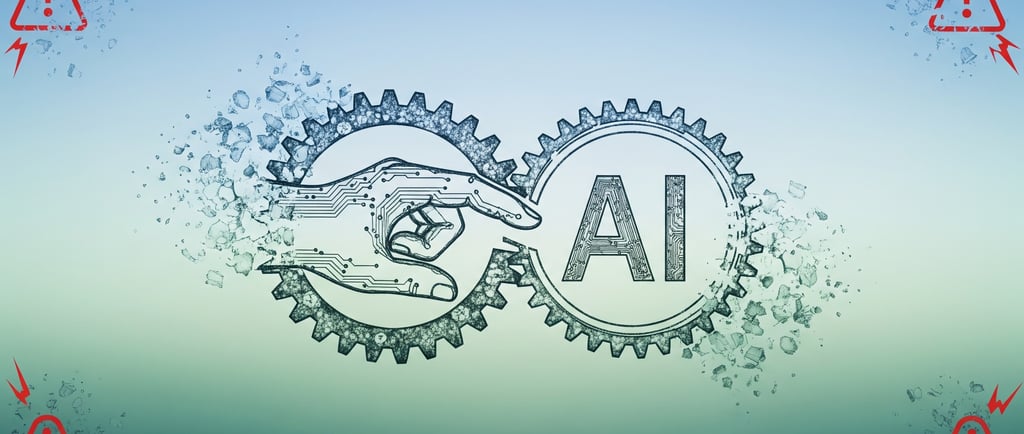Myth Busters: Debunking Common Fears About AI Taking Over Jobs
Olivia Bennett
5/9/20254 min read


Artificial Intelligence. The term itself can conjure up a wide range of images, from helpful digital assistants to, for some, the dystopian vision of robots rendering human jobs obsolete. It's a narrative often fuelled by science fiction and sensationalist headlines. But how much of this fear is grounded in reality, and how much is simply myth?
As AI becomes increasingly integrated into our workplaces and daily lives, it's crucial to separate fact from fiction. Understanding what AI truly is (and isn't) can help businesses and employees alike navigate this technological evolution with confidence rather than apprehension. Let's bust some of the most common myths surrounding AI and the workforce.
Myth #1: AI is Going to Take Everyone's Job.
The Reality: AI is More Likely to Change Jobs and Create New Ones Than Eliminate Them En Masse.
This is perhaps the most pervasive fear. While it's true that AI and automation will transform certain tasks and roles, particularly those that are repetitive, data-intensive, or predictable, history shows that technological advancements tend to reshape the job market rather than shrink it.
Task Augmentation, Not Just Replacement: AI often takes over specific tasks within a job, freeing up humans to focus on more complex, creative, strategic, and empathetic aspects of their roles. For example, an AI might automate data entry for an accountant, allowing them to spend more time on financial analysis and client advisory.
Creation of New Roles: The rise of AI is creating entirely new job categories that didn't exist a decade ago: AI ethicists, AI trainers, AI system maintenance specialists, data scientists specializing in AI, prompt engineers, and professionals who manage AI-human collaboration.
Increased Productivity and Economic Growth: By improving efficiency and enabling innovation, AI can contribute to overall economic growth, which historically leads to job creation in other sectors.
Think of it like this: The invention of the personal computer didn't eliminate all office jobs; it changed them and created new industries around software development, IT support, and digital marketing.
Myth #2: AI Will Only Benefit Big Corporations, Leaving Small Businesses Behind.
The Reality: AI is Becoming Increasingly Accessible and Affordable, Offering Significant Advantages for Small and Medium-sized Enterprises (SMEs).
While early AI development was often resource-intensive, the landscape has changed dramatically. Cloud computing, open-source AI models, and a plethora of AI-powered Software-as-a-Service (SaaS) tools have democratised access to AI.
Levelling the Playing Field: SMEs can now leverage AI for tasks like customer service (AI chatbots), marketing (AI-powered analytics and content generation), operations (AI for inventory management), and much more, often at a fraction of the cost previously imagined.
Competitive Edge: AI can help SMEs compete more effectively with larger players by automating processes, gaining deeper customer insights, and personalising services.
Tailored Solutions: Companies like DialogueFlow specialise in helping SMEs find and implement the right AI solutions that fit their specific needs and budgets, rather than one-size-fits-all approaches.
Myth #3: AI is All-Knowing and Infallible.
The Reality: AI Systems are Tools Designed by Humans, and They Have Limitations and Potential Biases.
AI is powerful, but it's not omniscient or perfect. AI models learn from the data they are trained on.
"Garbage In, Garbage Out": If the training data is biased, incomplete, or inaccurate, the AI's output will reflect those flaws. This can lead to unfair or discriminatory outcomes if not carefully managed.
Lack of Common Sense and True Understanding: While AI can process information and identify patterns at incredible speeds, it doesn't possess human-like common sense, intuition, or a deep understanding of context in the same way we do. It can make mistakes or generate nonsensical outputs, especially in unfamiliar situations.
Need for Human Oversight: Critical decisions should always involve human judgment and oversight. AI can provide valuable insights and automate tasks, but the ultimate responsibility and ethical considerations lie with humans.
Myth #4: You Need to Be a Tech Genius to Use or Implement AI.
The Reality: Many Modern AI Tools are Designed to Be User-Friendly, and Expert Partners Can Handle the Complexities.
The user interfaces for many AI applications are becoming increasingly intuitive. You don't need a PhD in computer science to use an AI-powered writing assistant or an AI analytics dashboard.
Low-Code/No-Code Platforms: There's a growing number of platforms that allow businesses to implement AI solutions with minimal coding.
Focus on the "What," Not Just the "How": Business leaders should focus on what they want to achieve with AI (e.g., improve customer response times) rather than getting bogged down in the technical minutiae of how the AI works.
Expert Guidance: For more complex or tailored AI integrations, partnering with AI specialists like DialogueFlow means you don't have to become an AI expert yourself. We handle the technical heavy lifting, allowing you to focus on your core business.
Embracing AI: A Collaborative Future
The narrative of "AI vs. Humans" is misleading. The most productive and innovative future is one where AI and humans work collaboratively. AI can augment human capabilities, automate tedious tasks, and provide insights that empower us to make better decisions and focus on more meaningful work.
Yes, there will be a transition, and a focus on upskilling and reskilling the workforce will be essential. But by understanding the realities of AI and debunking the myths, businesses can approach this technological shift as an opportunity for growth and enhancement, rather than a threat.
At DialogueFlow, we believe in demystifying AI and making its benefits accessible to all businesses. We can help you understand how AI can specifically enhance your operations and empower your team, ensuring a smooth and positive integration.
Worried about AI's impact? Let's talk. Contact DialogueFlow to explore how AI can be a powerful ally for your business and your people.
Contacts
Location
ben@dialogueflow.co.uk
© 2025. All rights reserved.
Suite A, 82 James Carter Road, Mildenhall, IP28 7DE
